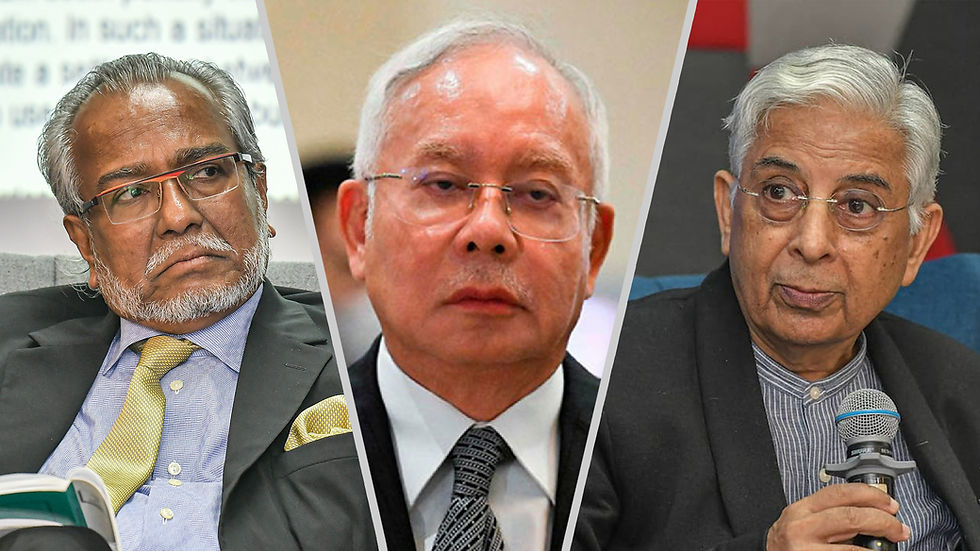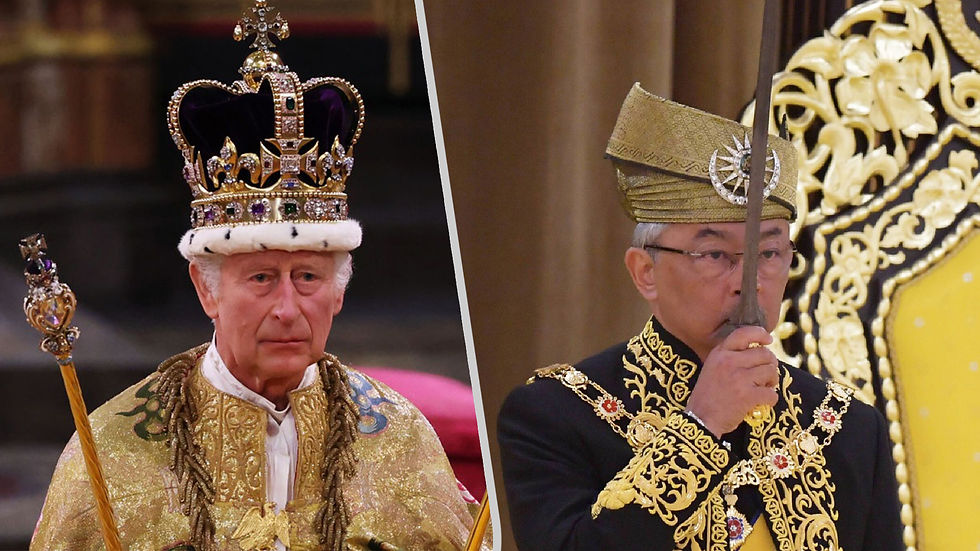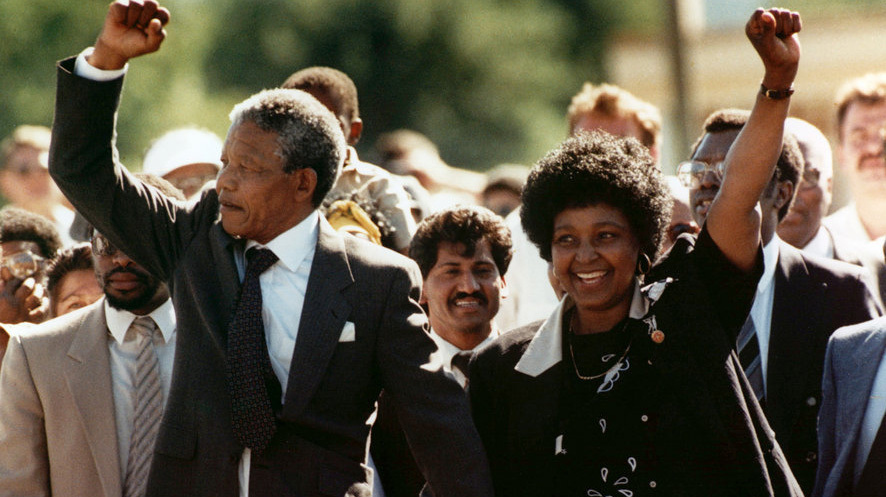Najib's Pardon: Can It Be Challenged?
- Edward Lee

- Feb 26, 2024
- 6 min read

This is the second part of Najib's Pardon: Is It in Line with The Rule of Law. Have a read of that first!
Last Thursday, the Bar Council and CSO Platform for Reform hosted 'Justice and Mercy: A Forum on Reforms to the Pardons Board in Malaysia'.
One main point of contention during the forum was whether royal pardons can be reviewed by the courts or are they the sole prerogative of the King, not to be questioned by anyone?
As the article reports, Prof Shad started the forum with a radical legal take, but this was met with disagreement from Tan Sri Shafee, who basically said that the law of the land is clear — royal pardons are simply unjusticiable (or untouchable).
So, what are their points? Who is right?
It's unreviewable, the Courts say so!
The media does not report this, but both sides start off on common ground.
Both recognise that, right or wrong, the law ultimately is what the courts say it is. And the superior courts have said a royal pardon is an unreviewable prerogative of the sovereign, ever since 1985 in Sim Kie Chon up till 2023 in DSAI v Mohd Khairul Azam.
Tan Sri Shafee even paraphrases the former Lord President, Tun Suffian, to say:
If the Federal Court makes a mistake, it becomes the law of the land.
As you will see, Prof Shad's emphasis would be on the first half of this quote, whereas Shafee focuses on the latter half.
This is not the UK

Prof Shad disagrees that the royal pardon in Malaysia is a prerogative like it is in the UK. In the UK, the power to pardon forms part of the inherent attributes of the monarch, not provided by any written law — hence the term "royal prerogative", by definition.
However, in Malaysia, the power to pardon is created through the Constitution (Articles 40 & 42) and written legislation, which provides for a Pardons Board of a specific composition to be formed, with specific procedures to be followed, and that the King is bound by advice — hence not a prerogative.
Moreover, with royal immunity stripped from the royalty in 1993, Sultans and Princes who are convicted by a court of law can become petitioners for royal pardons. There are even circumstances where the King may be disqualified from sitting on the board due to conflict of interests. Prof Shad argues that it makes no sense if a prerogative is used against the holder of the prerogative.
The argument is that our courts, who have described pardons as unreviewable prerogatives, have been viewing it wrongly. The 2020 High Court decision of Mohd Khairul Azam did actually make this exact argument, but it was eventually overturned by the Court of Appeal.
Challenging the Pardons Board
Be that as it may, Prof Shad proposes that in any event, a challenge against the advice of the Pardons Board may be possible, based on the English case of R (Miller) v The Prime Minister where the British PM's advice to the Queen to prorogue Parliament was declared unlawful and void.
Essentially, this means reviewing the decision of the King without actually touching upon any of His Majesty's powers. Very indirect.
Pardons have been reviewed in this manner in the UK and India.
In R v Secretary of State for the Home Department ex parte Bentley, the Home Secretary's advice to the Queen was held to be reviewable.
In Satpal v State of Haryana, the Supreme Court quashed the Governor's decision to pardon on the basis that the Governor was not properly advised.
The Point of Mercy
Shafee argues that there is good reason for the courts to view pardons as unreviewable prerogative because it provides comfort for the King to decide based on broader considerations, as long as it satisfies His Majesty's conscience.
In other words, it is to preserve the human touch of pardons. Hence, pardons should not be dragged through the courts to discuss how wrong or silly they are. By subjecting pardons to rigid and technical justice, it would defeat the whole point of mercy.
Shafee illustrates his argument with a few case examples, in which he was personally involved. Here's one of them:
Kenneth Fook Mun Lee, the grandson of Tun HS Lee, was sentenced to death by the apex court for going on a shooting spree (near the Istana Negara no less), killing one woman.
Because the Pardons Board considered that Kenneth was the only surviving child of his aging father, his death sentence was commuted to life imprisonment then to house arrest, so that he could take care of his dad.
Broader considerations like this, according to Shafee, is what courts would not be able to consider in the administration of justice. That is why pardons should not be subject to restrictions.
Nevertheless, the pardon of Kenneth Lee has drawn criticisms of special treatment as well.
Where Justice fails, Mercy steps in?
In addition, Shafee speculates that the Pardons Board must have also thought that the Federal Court and the Court of Appeal went wrong in finding Kenneth guilty. Why?
Because when Kenneth was arrested, he had soiled himself and was firing blanks randomly. Shafee says due to hypoglycaemia, he was as good as mad at that time.
So, according to him, pardons also serve to correct any injustice occasioned upon a convict, without needing to go through a whole review process before the courts.
Although Shafee is purely speculating, he is not entirely wrong to say that one of the functions of pardons is to correct mistakes in the legal system (at least according to American jurisprudence) giving another reason for pardons to be kept far away from the courts.
Najib is not asking for forgiveness
The reason he brings up this point is this: many have been criticising Najib's partial pardon because he is unrepentant, thus undeserving of the pardon. But comments like this miss the point of Najib's pardon application!
Najib is saying that he has been prejudiced; that a grave injustice has been occasioned upon him because he was not given the opportunity to be heard during his final appeal to the Federal Court. That is why he needs the pardon.
When Najib had a last-minute change in solicitors who requested for an adjournment to prepare for the case, the Federal Court did not allow it (despite finding ultimately that it was not a conspiracy to frustrate proceedings).
Najib's new lawyer ended up staying silent throughout, and Najib argues that this robbed him of his right to be heard. Dato' Abdul Rahman Sebli CJSS, agrees with this proposition in his dissenting judgment where he opined that Najib ought to be acquitted.
Perhaps the King or the Pardons Board were convinced by this argument and thus sought to correct this alleged injustice.
All we know is that this incident certainly lends credence to the perception that Najib was victimised.
Shafee also claims double standards; that the "same bench" agreed to adjourn the appeal of six men convicted of Kevin Morais' murder due to a last-minute solicitor change. However, that is an inaccurate claim as it was the Court of Appeal who decided so, not the Federal Court.
I wonder, would public perception have been different if the Federal Court granted the adjournment and postponed Najib's conviction?
Back to the Question
So, can a royal pardon be reviewed? As case law presently stands, probably not.
But can the Pardons Board's advice to pardon be reviewed? Maybe. Since the Federal Court has yet to opine on this specific question, it has not given a definite no to this approach.
It would be a landmark decision, even if the action ultimately fails, because this would at least clarify one of the many ambiguous aspects of our Constitution.
Healing Wounds, Truly
Anyway, this is not saying that the pardon must be challenged at all costs, due to some deep hatred towards Najib. That's just being petty and unreasonable.
This issue is bigger than Najib. It's about working towards a more robust and reliable system of justice in Malaysia, where the scope of mercy or pardons can be better defined; where it has a more proper place.
This is important because a pardon is more than just setting a convict free. This exercise of mercy serves a broader purpose. What is it? To quote Prof Shad,
[A]round the world the power of pardon is found in the best of democracies. In some situations, it works to heal wounds.

And these wounds on both sides of the divide (whether you are for or against Najib's pardon) can only be truly healed if it does not appear like there is hanky panky going on behind the palace gates.





Comments